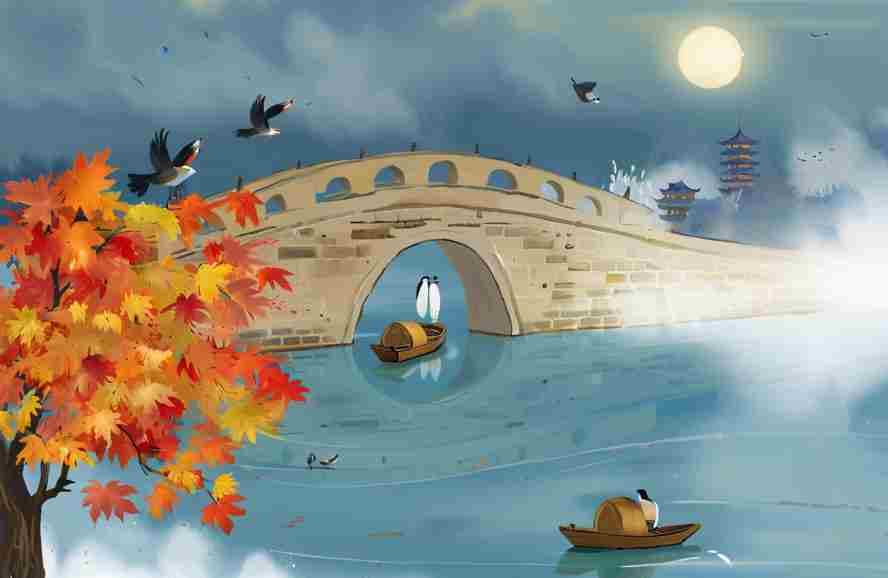Classic Chinese Ancient Poems

I. The Charm of Ancient Poems: Crossing National Borders
Chinese ancient poems, as the treasures of Chinese culture, have exerted a widespread influence and possess great value on a global scale.
How to Do the Reading-Aloud Training
The reading-aloud module in the "ABC Chinese" APP contains commonly used Chinese ancient poems. Learners can practice pronunciation and recitation through reading aloud, thus being able to master more ancient poems.
This APP provides learners with a convenient platform for reading aloud. During the process of reading aloud, learners can imitate the standard pronunciation word by word and accurately grasp the rhythm and meter of ancient poems. For example, when reading aloud the ancient poem "Chūn Xiǎo" (《春晓》), which goes like "Chūn mián bù jué xiǎo, chù chù wén tí niǎo. Yè lái fēng yǔ shēng, huā luò zhī duō shǎo." (春眠不觉晓,处处闻啼鸟。夜来风雨声,花落知多少。), learners can feel the breath of spring in the verses and the poet's delicate observation of nature through repeated reading aloud.
The charm of Chinese ancient poems crosses national borders, and the reading-aloud module of the "ABC Chinese" APP provides a new way for learners all over the world to learn and appreciate Chinese ancient poems. Let's experience the profoundness and extensiveness of Chinese ancient poems together through reading-aloud training.
II. Ten Classic Poems, Each Displaying Its Unique Splendor
(1) 《登鹳雀楼》 (Dēng Guàn Què Lóu) - “On The Stork Tower” by Wang Zhihuan (王之涣)
白日依山尽 (bái rì yī shān jìn)
黄河入海流 (huáng hé rù hǎi liú)
欲穷千里目 (yù qióng qiān lǐ mù)
更上一层楼 (gèng shàng yī céng lóu)
English Translation:The sun along the mountain bows;
The Yellow River seawards flows.
You can enjoy a great sight;
By climbing to a greater height.
(2) 《静夜思》 (Jìng Yè Sī) - “Thoughts in the Silent Night” by Li Bai (李白)
床前明月光 (chuáng qián míng yuè guāng)
疑是地上霜 (yí shì dì shàng shuāng)
举头望明月 (jǔ tóu wàng míng yuè)
低头思故乡 (dī tóu sī gù xiāng)
English Translation:Before my bed a pool of light;
Is it hoarfrost on the ground?
I lift my eyes and see the moon;
I bend my head and think of home.
(3) 《春望》 (Chūn Wàng) - “Spring View” by Du Fu (杜甫)
国破山河在 (guó pò shān hé zài)
城春草木深 (chéng chūn cǎo mù shēn)
感时花溅泪 (gǎn shí huā jiàn lèi)
恨别鸟惊心 (hèn bié niǎo jīng xīn)
烽火连三月 (fēng huǒ lián sān yuè)
家书抵万金 (jiā shū dǐ wàn jīn)
白头搔更短 (bái tóu sāo gèng duǎn)
浑欲不胜簪 (hún yù bù shèng zān)
English Translation:Though a country be sundered, hills and rivers endure;
And spring comes green again to trees and grass.
Where petals have been shed like tears;
And lonely birds
(4) 《草》 (Cǎo) - “Grass” by Bai Juyi (白居易)
离离原上草 (lí lí yuán shàng cǎo)
一岁一枯荣 (yī suì yī kū róng)
野火烧不尽 (yě huǒ shāo bù jìn)
春风吹又生 (chūn fēng chuī yòu shēng)
English Translation:The grass on the plain spreads far and wide;
It withers and flourishes once a year.
Wildfires can't burn it all up;
With the spring breeze it comes to life again.
(5) 《枫桥夜泊》 (Fēng Qiáo Yè Bó) - “Mooring at Night by Maple Bridge” by Zhang Ji (张继)
月落乌啼霜满天 (yuè luò wū tí shuāng mǎn tiān)
江枫渔火对愁眠 (jiāng fēng yú huǒ duì chóu mián)
姑苏城外寒山寺 (gū sū chéng wài hán shān sì)
夜半钟声到客船 (yè bàn zhōng shēng dào kè chuán)
English Translation:The moon is setting, crows are cawing, and frost fills the sky;
By the maple trees on the river, fishermen's lights face my sad sleep.
From the Cold Mountain Temple outside Gusu City;
The midnight bells reach the traveler's boat.
(6) 《游子吟》 (Yóu Zǐ Yín) - “A Song of the Traveling Son” by Meng Jiao (孟郊)
慈母手中线 (cí mǔ shǒu zhōng xiàn)
游子身上衣 (yóu zǐ shēn shàng yī)
临行密密缝 (lín xíng mì mì féng)
意恐迟迟归 (yì kǒng chí chí guī)
谁言寸草心 (shuí yán cùn cǎo xīn)
报得三春晖 (bào dé sān chūn huī)
English Translation:The thread in the kind mother's hand;
Is making the clothes for the traveling son.
Before he leaves, she sews it closely;
Fearing he'll return late.
Who says the heart of an inch-long grass;
Can repay the warmth of the spring sun?
(7) 《赋得古原草送别》 (Fù Dé Gǔ Yuán Cǎo Sòng Bié) - “Composing on the Ancient Plain Grass for a Farewell” by Bai Juyi (白居易)
离离原上草 (lí lí yuán shàng cǎo)
一岁一枯荣 (yī suì yī kū róng)
野火烧不尽 (yě huǒ shāo bù jìn)
春风吹又生 (chūn fēng chuī yòu shēn)
远芳侵古道 (yuǎn fāng qīn gǔ dào)
晴翠接荒城 (qíng cuì jiē huāng chéng)
又送王孙去 (yòu sòng wáng sūn qù)
萋萋满别情 (qī qī mǎn bié qíng)
English Translation:The grass on the ancient plain spreads far and wide;
It withers and flourishes once a year.
Wildfires can't burn it all up;
With the spring breeze it comes to life again.
The distant fragrance invades the ancient path;
The sunny green connects the desolate city.
Once again I send the noble youth away;
The lush grass is full of parting feelings.
(8) 《望庐山瀑布》 (Wàng Lú Shān Pù Bù) - “Watching the Waterfall on Mount Lu” by Li Bai (李白)
日照香炉生紫烟 (rì zhào xiāng lú shēng zǐ yān)
遥看瀑布挂前川 (yáo kàn pù bù guà qián chuān)
飞流直下三千尺 (fēi liú zhí xià sān qiān chǐ)
疑是银河落九天 (yí shì yín hé luò jiǔ tiān)
English Translation:The sun shines on the Incense Burner Peak, giving birth to purple smoke;
Looking afar at the waterfall hanging in front of the river.
The water rushes down straight for three thousand feet;
It seems as if the Milky Way were falling from the ninth heaven.
(9) 《早发白帝城》 (Zǎo Fā Bái Dì Chéng) - “Leaving the White Emperor City at Dawn” by Li Bai (李白)
朝辞白帝彩云间 (zhāo cí bái dì cǎi yún jiān)
千里江陵一日还 (qiān lǐ jiāng líng yī rù huán)
两岸猿声啼不住 (liǎng àn yuán shēng tí bù zhù)
轻舟已过万重山 (qīng zhōu yǐ guò wàn chóng shān)
English Translation:At dawn I left the White Emperor City among the colored clouds;
To return to Jiangling a thousand miles away in a single day.
The cries of monkeys on both banks never ceased;
My light boat has already passed countless mountains.
(10) 《绝句》 (Jué Jù) - “Quatrain” by Du Fu (杜甫)
两个黄鹂鸣翠柳 (liǎng gè huáng lí míng cuì liǔ)
一行白鹭上青天 (yī xíng bái lù shàng qīng tiān)
窗含西岭千秋雪 (chuāng hán xíng lǐng qiān qiū xuě)
门泊东吴万里船 (mén bò dōng wú wàn lǐ chuán)
English Translation:Two golden orioles are singing among the green willows;
A row of white egrets are flying up to the blue sky.
The window frames the snow on the Western Hills for thousands of years;
The door is moored with ships from the Eastern Wu for ten thousand miles.



